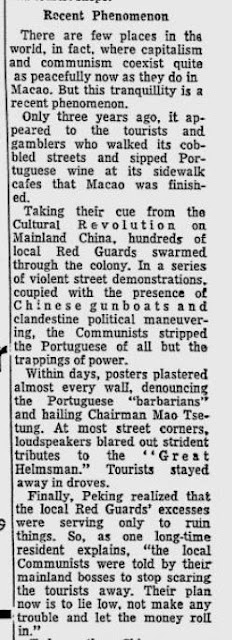O artigo é da agência Newsweek e foi reproduzido em inúmeros jornais um pouco porto todo o mundo, mas sobretudo nos EUA. Com o título "Macao Still Outpost of Capitalism" (ponto avançado do capitalismo), dá conta das particularidades do território no início da década de 1970, uma 'lança' do capitalismo vizinho da China comunista, um paradoxo que parecia resultar após as dificuldades das manifestações anti-imperialismo de meados da década de 1960. A fotografia, uma panorâmica da baía da Praia Grande em 1969, não faz parte do artigo.
"The most startling fact about this tiny Portuguese colony 40 miles southwest of Hong Kong is that it still exists at all. Perched on a 6 1/2 square mile penisula that juts out toward the South China Sea, it is a remote outpost of capitalism that sits vulnerably right under the massive presence of communist China.
"The Chinese,", says onde resident, "could take this place with one phone call any time". But hey haven't taken Macao and the reason, ironically enough for disciples of Karl Marx, is purely and simply crass materialism. The little colony is a fiscal gold mine and Peking would surely lose much more that it could possibly gain by swalling it up.
As the Monte Carlo of the East, Macao attracts thousands og eager gamblers and tourists from all over the world to its casinos and famous dog track. And as the behind-the-scenes power, the Communists rake in millions of dollars a year from the money these visitors shell out at roulette tables, betting spots and tourists shops.
There are few places in the world, in fact, whre capitalism and communism coexist quite as peacefully now as they do in Macao. But his tranquility is a recent phenomenom.
Only three years ago, it appeared to the tourists and gamblers who walked its cobled streets and sipped Portguese wine at its sidewalk cafes that Macao was finished.
Taking there cue from cultural Revolution on Mainland China, hundreds of local Red guards swarmed through the colony In a series of violent street demonsgtrations coupied with the presence of Chinese gunshots and clandestine political maneuvering the Communists stripped the Portuguese of all but the trappings of power. (...)
Finally Peking that the local Red Guards excesses were serving only to ruin things. (...) Nothing is done without Peking's permission. this power is exercised chiefly through the local chamber of commerce which is dominated by a mysterious millionaire named Ho Yin.
Ho has the unique distinction of being a practicing capitalist and a dedicated Communist. (...)
With the new rapproachement, a Riviera-like calm once again prevails in Macao. And the colony is enjoying a general economic boom, epitomized by the new, high-rising, 333-room Lisboa luxury hotel. (...)
209 new businesses were started last year most of them shops and small factories making and selling everything from binoculars to insense. (...)
When the two-mile bridge is completed from Macao to the islands of Taipa and Coloane, some 4 1/2 square miles of underpopulated land will be available for business, residential and resort development. (...) Probably nowhere else in the world can signs advertising American cars, English cigarettes and Japanese watches be seen interspersed with official posters proclaiming "Long Live The communist Party" and "Long Live Chaiman Mao".
Reading Eagle - 22.07.1970





Sem comentários:
Enviar um comentário